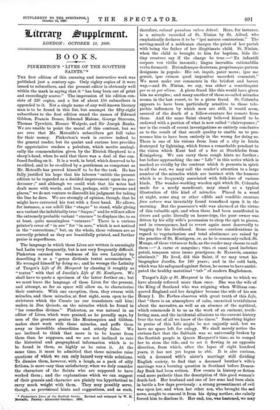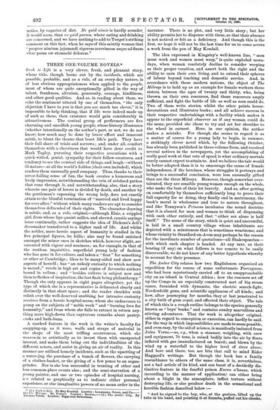BOOKS.
PINKERTON'S " LI V ES OF THE SCOTTISH SAINTS."*
THE first edition of this amusing and instructive work was published just a century ago. Only eighty copies of it were issued to subscribers, and the present editor is obviously well within the mark in saying that it "has long been out of print and exceedingly scarce." The impression of his edition con- sists of 220 copies, and a list of about 150 subscribers is appended to it. Not a single name of any well-known literary man is to be found in this list, but amongst the fifty-eight subscribers to the first edition stand the names of Edward Gibbon, Francis Douce, Edmond Malone, George Steevens, Thomas Tyrwhitt, Horace Walpole, and Sir Joseph Banks. We are unable to point the moral of this contrast, but we are sure that Mr. Metcalfe's subscribers get full value for their money. Pinkerton's work is caviare indeed to the general reader, but its quaint and curious lore provides for appreciative readers a pabulum, which merits analogi- cally the commendation given by the Ettrick Shepherd to a sheep's-head, when he said that there was a deal of. . fine con- fused feeding on it. It is a work, in brief, which deserved to be re-edited, and to be re-edited by a gentleman as competent as Mr. Metcalle has proved himself to be for the task. He has fully justified his hope that his labours "entitle the present edition to be regarded as a decided improvement upon its pre- decessor ;" and although we could wish that his notes had dealt more with words, and less, perhaps, with "persons and places," we do not venture to discredit his judgment for taking the line he does. We are strongly of opinion, though, that he might have corrected his text with a freer hand. He allows, for instance, a vox nihili like " utaque " to stand, while -giving as a variant the indubitably true " itaque ;" and he will not allow the extremely probable variant " exarare " to displace the, to us at least, quite meaningless " cataxare." There is a curious printer's error of "in fere " for "in aerc," which is not noticed in the "corrections ;" but, on the whole, these volumes are as correctly printed as they are beautifully printed, and further praise is superfluous.
The language in which these Lives are written is amusingly bad Latin very frequently, but is not very frequently difficult. Pinkerton excused the weakness of his own Latinity by describing it as a "genus dictiouis textui accomodatum." He wronged himself by doing so ; and he wrongs the Latinity of Turgot's Life of St. Margaret by classing it roughly as " textus " with that of Jocelin's Life of St. Sentigern. We shall have to quote a specimen of the latter further on; but we must leave the language of these Lives for the present, and attempt, so far as space will allow us, to characterise their contents. With one exception, then, they swarm with miracles, and these miracles, at first sight, seem open to the strictures which the Curate (as our translators call him) makes, in Don Quixote, on the miracles which he found in " las comedias divinas." Pinkerton, as was natural in an editor of Lives, which were praised, as he proudly .says, by men of the greatest genius like Montesquieu and Gibbon, makes short work with these miracles, and puffs them away as incredible absurdities and utterly false. We are inclined to think that more is to be learnt from them than he supposes, and we are not inclined to rate the historical and geographical information which is to be found in them, so highly as he rates it. At the same time, it must be admitted that these miracles raise questions of which we can only hazard very wide solutions.
To dismiss them, however, with a laugh, as a pack of silly fictions, is more easy than satisfactory, when we duly consider the characters of the Saints who are supposed to have worked them; and the explanations which we can suggest of their genesis and character are plainly too hypothetical to carry much weight with them. They may possibly serve, though, as provisional hints and suggestions, and as such,
* Pinkerton's Ifired of the Scottish Saints. Revised and enlarged by W. M. YeteeXe. Paisley : Alexander Gardner. 1888. therefore, valeant quantum valere debent. Here, for instance, is a miracle recorded of St. Ninian by St. Allred, who emphatically declares it to be " ipsi natura3 contrarium." The serving-maid of a nobleman charges the priest of her parish with being the father of her illegitimate child. St. Ninian, when the child is brought to him for baptism, bids the tiny creature say if the charge be true :—" Ex infantili corpore vox virus insonuit ; lingua inerudita rationabilia verba formavit. Extendensque dexteram, propriumque patrem designans in populo : Hie est, inquit, pater mend; ipse me genuit, ipse crimen quod imponitur sacerdoti commisit." We must make our comments in the briefest and barest way,—and St. Ninian, we say, was either a ventriloquist per se or per alium. A pious fraud like this would have given him no scruples; and many another of these so-called miracles seems, in the last resort, to be a pious fraud. St. Columba appears to have been particularly sensitive to those tele- pathic influences by which men are still, it would seem, assured of the death of a fellow-creature far remote from them. And the same Saint clearly believed himself to be endowed with a portion of what is now called "clairvoyance ;" nor is the result of recent investigations so entirely conclusive as to the result of that occult quality to enable us to pro- nounce him to have been entirely in the wrong for doing so. There is one of his visions from Iona of a city in Istria destroyed by lightning, which forms a remarkable pendant to the vision which Kant had of a fire at Stockholm from Konigsberg. We can carry these rough hints no further; but before approaching the one " Life " in this series which is marked so vividly by the contrast which it presents in spirit to all the rest, we may call the reader's attention to a large number of the miracles which are instinct with the humour which is so frequently associated with folk-lore of various kinds. The wonder-working wooden spit which St. Columba made for a needy mendicant, may stand as a typical illustration of this kind of miracles. Placed in a wood at night, some stag or other edible and vendible creature fern naturx was invariably found transfixed upon it in the morning. But the possessor's wife was alarmed at the virtue of this valuable spit, and when these had been manifested in rivers and quite literally on house-tops, the poor owner was driven by his silly wife's persuasion to chop the spit to pieces, and in consequence, had to revert again most deservedly to begging for his livelihood. Some curious considerations in regard to vegetarianism and total abstinence are raised by the practice of St. Kentigern, or, as he is commonly called, St. Mungo, of these virtues or fads, as the reader may choose to call them :—" A came et sanguine ; vino, et omni quod inebriare potuit, tanquam unus immo pmecipuus, de Nazareis, omnino abstinuit." He lived, did this Saint, if we may trust his biographer Jocelin, for 160 years ; and in the cold bath, which was his safeguard against Satan, he seems to have antici- pated the healthy matutinal " tub " of modern Englishmen.
Turgot's Life of St. Margaret is the exception to which we have already referred more than once. She was the wife of the King of Scotland who was reigning when William con- quered England and her daughter became the wife of his son Henry I. Dr. Forbes observes with great truth of this Life, that "there is an atmosphere of calm, unexcited truthfulness about the narrative, as well as an absence of the mythical, which commends it to us as the work of an eminent, truth- loving man, and the incidental allusions to the current history bear the test of all we know of the times." Something higher in praise of this Life might be not unjustly said, but we have no space left for eulogy. We shall merely notice the curious fact that the Sabbath was so universally broken by the Scottish people in Queen Margaret's time, as to compel her to stem the tide, and to set it flowing in an opposite direction, from which, after the lapse of eight hundred years, it has not yet begun to ebb. It is also curious, with a deceased wife's sister's marriage still dividing English society, to find that a deceased brother's wife's marriage was a burning question in Scotland before Domes- day Book had been written. Few events in history or fiction read more pathetic than the description of this good woman's death-bed. Her husband and one of her sons had been slain in battle a few days previously : a strong presentiment of evil was upon her, and when her other son, who brought the sad news, sought to conceal it from his dying mother, she calmly forced him to disclose it. Her end, too, was hastened, we may notice, by vagaries of diet. He quid ninths is hardly sounder, it would seem, than ne quid parum, where eating and drinking are concerned, and we have nothing to add to Turgot's striking comment on this fact, when he says of this saintly woman that " propter nimium jejmiandi rigorem acerrimum usque ad fmem vitae passa est stomachi dolorem."



















































 Previous page
Previous page